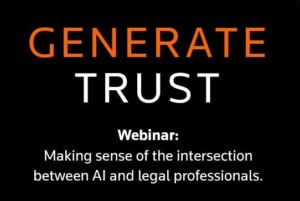Every significant new technology brings threats, disruption – and opportunity. AI arguably brings the most potential.
This was confirmed in a Thomson Reuters survey in early 2023, which had a number of interesting findings – particularly that 82% of law firms and corporate legal departments said they clearly saw legal use cases for AI, and that more than half said that legal should be using AI.
Jump to:
| What are the clearest use cases for AI in legal? |
| How will AI benefit legal professionals? |
| Reasons to be cautious |
| Will AI take over legal work? |
What are the clearest use cases for AI in legal?
There are numerous ways that legal professionals could be putting AI to work right now – using AI to recapture revenue, help to reduce cost centers, and find ways to add value to existing client relationships.
In everyday legal matters, AI can massively accelerate searches for key wording or clauses. It can be used to get a first draft down – particularly helpful as it’s always easier to start with a page that has content on it, rather than a blank one. It can be used to summarize key issues or causes of action in a case. It can also help you with ideas and make suggestions – perfect for where you have a sense of what you’re looking for.
 | There are more use cases suggested and discussed in a recent webinar that you can now watch on-demand. Don’t miss out! |
How will AI benefit legal professionals?
It depends on the size of your practice and the seniority of your attorneys. Small firms or departments may benefit more immediately, because they can get even more from their new associates. Searching documents, legal research, and writing draft contracts – typical responsibilities for junior attorneys – are tasks that can be streamlined, automated, or simplified with generative AI. So, by using it, new associates will be free to move to more strategic work more quickly.
This points to a clear benefit: solo attorneys and smaller firms will find that using generative AI innovatively enables them to take on matters they couldn’t before, including expanding into new practice areas, which can help grow their business. In fact, one survey respondent said that it’s the lack of volume of legal talent that is holding their firm back – and that in a few years, with AI technology fully installed, they could go head-to-head with other, bigger firms.
At the other end of the spectrum, more senior attorneys in larger firms or departments should be thinking strategically about AI use cases – considering what’s a good fit for the firm, its clients, or the business – and raising awareness of the efficiencies that the tools could deliver to lower costs or boost growth. Helping to implement AI could actually be an important career booster, as it will help position the practice and every legal professional in it, for the future.
Reasons to be cautious
Unsurprisingly for the legal profession, there were plenty of survey respondents who were more cautious – 24% said legal should not be using AI, and 25% didn’t know. For example, there are concerns around accuracy, privacy, and confidentiality.
Generative AI can easily create content that has inaccurate information in it – and has been prone to “hallucinations”. It also opens up questions around whether client disclosure is required, and to what extent. Additionally, other broader issues such as institutional resistance to understanding of new technologies – especially when it comes to convincing older attorneys of its potential value.
In the recent webcast, Andrew Fletcher was asked a question on the minds of many: is generative AI truly ready for primetime in legal?
“It depends. Are we looking to automate something, or augment something? Those are two really different things, especially when it comes to legal professional work,” said Fletcher. “Automation is done with caution because you’re focusing on the outcome being 100% correct. Augmentation is about putting tools in the hands of experts who make decisions based on what tools tell them. And this is absolutely ready for primetime.”
Time and experimentation will make users more comfortable with generative AI tools, along with in-built data confidentiality and permission policies. Soon it will probably be common use within legal, just as online legal research and electronic signatures are today.
Will AI take over legal work?
This is one question that often comes up, and the answer is no.
Legal AI is specifically designed to help attorneys do their work. The legal profession has adopted many technologies over the years and hasn’t disappeared – on the whole, the legal professionals that adapt and adopt early will be the ones to do things faster, better, and more efficiently sooner.
For many legal departments, generative AI is the technology they’ve been waiting for. These tools enable legal professionals to focus on the more interesting work of lawyering, while still having control and command, and can free them from the low-grade administrative tasks that no lawyer likes to do – and clients don’t want to pay for.
AI can actually be a launchpad to do more and do better for your customers and clients – which is why it’s such a perfect partner.
Webcast: Making sense of the intersection between AI and legal professionals











